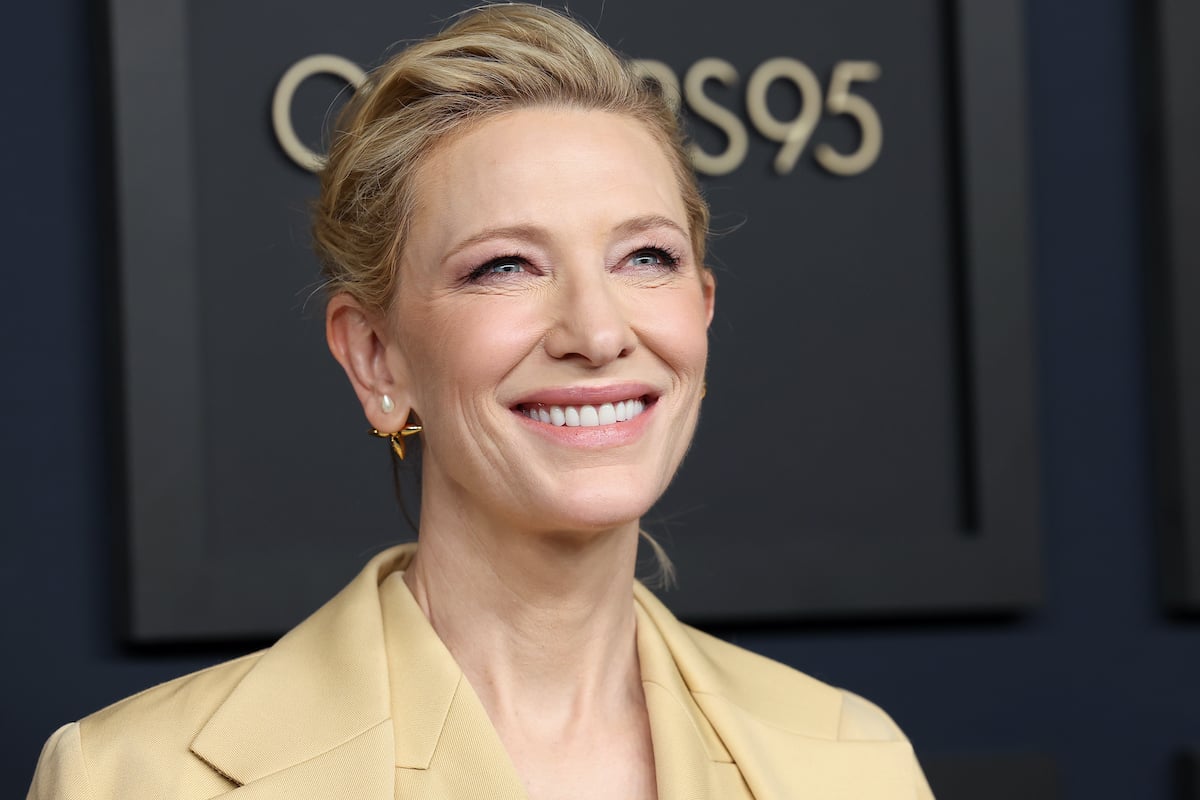You’ve heard the phrase, “never meet your heroes.” If you love Cate Blanchett, like me, the more relevant phrase right now might be “never read your hero’s interview in the new Vanity Fair.” Or, you know what, maybe do. Because then we can see that our heroes are complex people who are imperfect beings who, yes, have done wonderful, beautiful work—even playing some of recent cinema’s most iconic lesbian characters—but also now seem to be weirdly out of touch regarding issues like “identity politics” and end up saying some very cringe things to the media.
One quote that stood out to me as a particularly gross “oh no, Cate!” moment, was her reaction to a question about how she felt playing a queer person in her recent film, Tár, since she is a straight, cis person IRL. In response, she said she “doesn’t understand” the “obsession with labels.” And the whole world barfed.
“I don’t think about my gender or my sexuality,” she told David Canfield for Vanity Fair. And to that I say, well damn, that must be nice. Nobody questioning who you are, trying to deny you rights or healthcare? Good for you, honey.
“For me in school,” she continued, “it was David Bowie, it was Annie Lennox. There’s always been that sort of gender fluidity.” Ok, great. So no hate crimes at your school or work? No stabbings? No midnight kidnappings and months held against your will at conversion therapy camps? Ok great! That’s probably one reason why you “don’t think” about your gender or sexuality. Lucky you! Is embracing gender fluidity while refuting the validation many people find in “labels” and language the gender and sexuality equivalent of saying “I don’t see color”? No, but it’s close and it’s disgusting.
“I have to really listen very hard when people have an issue with it,” she told Canfield, and here “it” seems to refer to identity politics in this context, as well as the buzz around her or other straight, white, cis actors playing queer, trans, or non-white characters.
“I just don’t understand the language they’re speaking, and I need to understand it because you can’t dismiss the obsession with those labels—behind the obsession is something really important.” So, let’s give Blanchett her due, she is trying to listen. Canfield even describes the heat of the moment, saying “the topic clearly weighs on Blanchett, as she understands the sensitivity around it—and the potential for saying the wrong thing.” But does that refer to her trying to understand or to her desire to protect herself from so-called cancel culture?
Since the next word out of her mouth was a “But” and then a “personally, I’ve never had it,” I came away with the feeling that she was giving lip service more than having real respect for the queer community’s boundaries.
For instance, she questioned her much-lauded performance as a gay woman in the 2015 film Carol: “If it was made now, me not being gay—would I be given public permission to play that role?” Well, let’s see. She just attended the Academy Awards for her nomination as best actress in the Universal Pictures film, Tár, where she plays a queer woman so my guess is yes.
And, in what might be the biggest hole Blanchet dug for herself, she compared her situation to a cis actress being cast as a trans man (hmm, or was it the time that same white actress was cast as a Japanese character) then withdrawing after public outcry: “If you and I were having a conversation [25 years ago], it would be in your publication and that was it,” she said. “Now, somehow it’s like these opinions get published, and Scarlett Johansson doesn’t play a role that maybe she was the only person who could play it.”
(As a reminder, in 2018, Johansson dropped out of a film called Rub & Tug, in which she was cast to play a trans man, after basically the entirety of the internet let her know that was a bad idea. Apparently, Blanchett hasn’t gotten over it.)
And just like that, I can’t stan you anymore Cate. I loved you well, but negative news being brought to light and spreading and causing change is a good development, and you should be able to see that. Do you know what else would have happened 25 years ago? There would have been no cell phone footage to show the world the realities of repeated acts of racist police brutality. The Harvey Weinstein scandal would not have caught any traction. There would have been no social media and national reach for the #MeToo movement to spread the news and build up power in numbers. And yes, straight, cis actors would have been the only people being cast to play the very few LGBTQ+ characters represented on screen.
And for the last shovel full of dirt, she finished things up with that well-worn final-touch line: “I don’t want to offend anybody. I don’t want to speak for anybody else.” That’s cringe, Cate. Time to talk to a sensitivity coach.
(featured image: Monica Schipper/WireImage)









Published: Feb 14, 2023 05:49 pm